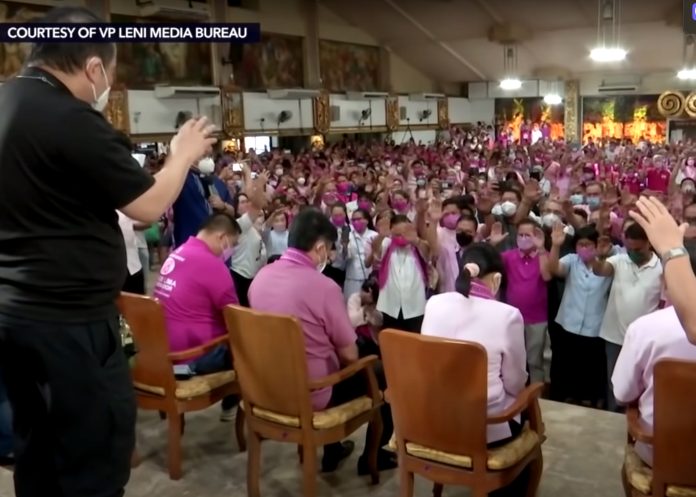These ten questions, and answers, aim to clarify issues confronting Filipino Christians, Catholics in particular, ahead of the country’s national elections in May 2022.
Can we use the pulpit for political campaigning?
Let me go back to Bishop Pablo David in the same press conference: “Ang pulpit ay para lamang sa pagpapahayag ng Mabuting Balita. Pero siempre kapag pinahayag mo ang Mabuting Balita, may implications siya tungkol sa political life. We cannot separate faith from our political life. Pero huwag gagamitin ang pulpit sa pangangampanya. This has a point. Kasi marami namang venues for expressing one’s political opinion. But in the pulpit, ang nangunguna ay ang Salita ng Diyos at ano ang implications ng paninindigang ito tungkol sa katotohanan, katarungan at kapayapaan.”
Does this injunction also refer to the members of religious communities like the sisters and religious brothers of Congregations?
We include the religious here even if the Canon 287 on which this topic is discussed directly refers to the “clergy”. Today, the same questions are asked by consecrated persons themselves. At this historical juncture, the religious also feel the same challenge towards partisan political participation. Canon 272 states that religious are bound by the prescripts of these canons (No. 277, 285, 286, 287, and 289).
Do the clergy and religious violate the freedom of the people to choose their leaders? Is endorsing a candidate a sign of “clericalism”?
What does an “endorsement” do? It is an act of sharing with the people the product of the clergy’s political discernment. It is to say that we have reflected on this seriously and this is what we have come up. It is not to arrogate unto themselves as clergy the right of the people to decide for themselves. It does not even impose their views on the faithful. Many of these statements end with an invitation to the faithful to do the same discernment themselves. In the end, it is still the individual Christian and his or her autonomous and free choice that has to be respected.
It is the “pastoral solicitude” of their shepherds to lead their faithful by example. In the Church, there is also such thing as “formation of conscience”. By sharing the fruit of their own discernment process, the priest and religious are helping their faithful discern in concrete — the how, the why and the what of it. In the process, they demonstrate that Gospel values are not abstract and detached realities; that Christians should not remain in the level of abstract principles. “Clericalism” happens when the clergy and religious separate themselves from the people; when they say “these are the principles, now apply them to your lives”. “But what about you, Father?” “It is up to you. I am non-partisan!” No, if the stakes are crucial today, personal decisions should have real consequences in our personal decisions and political options, even for the clergy and the religious.
What if those we have endorsed and their political programs do not deliver once they are elected?
On the one hand, we already know that there is no political program which is absolute. They are means to an end and they are not the only means. In theology, this refers to what is called the “eschatological proviso” — a provision that limits the valuation of the political realm. Any socio-political arrangement always falls short of the values of the Kingdom; thus, they always need to be continually critiqued and revised.
On the other hand, an all-out and absolute use of “eschatological proviso” (or a permanent “allergy” of political parties and ideologies in the Church) denies our authentic human political struggle of its necessary social vision and practical processes that furnish social agents with concrete ways toward human development and empowerment. “Faith without ideology is dead”, writes the Latin American theologian Juan Luis Segundo. To remain in the level of abstract principles and values renders the Christian vision impractical and incapable of incarnating itself in history. Beyond our principles, it is the well-thought of vision and programs of political parties that can incarnate the Christian vision in the world.
Having said that, it is also enjoined upon the clergy and religious to do continual criticism and demand for accountability from elected candidates and the political agenda they have endorsed. The whole Church—lay, clergy and religious—needs to critically engage the government and its programs with the values of the Gospel and the Kingdom. They should not be afraid to criticize their previously endorsed politicians and parties, and ask them to be accountable to the people.
We are not a “fans club” but “citizens”. We are not fanatics but prophets.
The prophets of old anointed the kings but they also confronted them with their abuses. Nathan vs. David, Elijah vs. Ahab, Isaiah vs. Hezekiah. In the same way, we are called to be prophets who continue to speak truth to power regardless of who occupies the seat of authority.
For us, no political agenda is absolute. Only the Kingdom is. “We are workers, not master builders; ministers, not messiahs. We are prophets of a future not our own.”
POST-SCRIPT
Reading all the positions on this matter in opinions found on mainstream media, FB posts, social networks, blogs, and even conversations among my friends, I have one observation:
Those who argue for non-partisanship today—some of them clerics and religious—have openly endorsed political candidates in the past or continue(s) to do so at present.
I do not know if this newly argued position on the matter is an expression of remorse or a sheer lack of reflexivity.
Father Daniel Franklin Pilario, C.M. is a theologian, professor, and pastor of an urban poor community in the outskirts of the Philippine capital. He is also Vincentian Chair for Social Justice at St. John’s University in New York.









